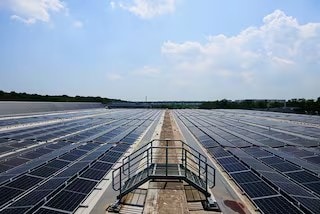PMI’s second Climate Transition Plan presents an updated and integrated strategy detailing actions, timelines, and targets to achieve net-zero greenhouse gas (GHG) emissions across its value chain by 2040.
The new plan builds on PMI’s 2021 Low-Carbon Transition Plan and 2022 Task Force on Climate-related Financial Disclosures report, aligning the company’s decarbonization strategy with the latest science, regulatory frameworks, and stakeholder expectations. It also details the results of a comprehensive climate change risks and opportunities (CCRO) assessment PMI conducted in 2024.
“This Climate Transition Plan reinforces our commitment to sustainability as a fundamental business driver at PMI—one that is integrated, performance-based, and economically grounded,” said Jacek Olczak, Chief Executive Officer.
“By focusing on material climate risks and opportunities, implementing cost-effective interventions, and maintaining robust disclosure practices, we are strengthening PMI’s ability to deliver sustained, long-term value.”
Key levers for driving decarbonization and resilience
“Our focus is on building resilience while managing climate-related risks through both mitigation and adaptation measures,” said Scott Coutts, Senior Vice President, Operations.
“This integrated approach allows us to mitigate our environmental impact, adapt our operations to climate realities, and unlock new sources of value across our supply chain.
“This is not just about reducing our own emissions—it is about leveraging our position to catalyze broader decarbonization.”
Science-based targets and long-term ambition
PMI’s new near- and long-term science-based targets—using a 2019 baseline and re-validated by the Science Based Targets initiative (SBTi)—reaffirm the company’s goal to achieve net-zero GHG emissions across its value chain by 2040. Specifically, PMI has targeted the following:
2040 targets
- 72 percent reduction in scope 3 forest, land, and agriculture (FLAG) GHG emissions
- 90 percent reduction in scope 1+2+3 GHG industrial emissions
2030 targets
- 50 percent reduction in absolute scope 1+2 GHG emissions
- 33.3 percent reduction in scope 3 FLAG GHG emissions
- 27.5 percent reduction in scope 3 industrial GHG emissions.
By pioneering solutions that address climate challenges while at the same time unlocking new market opportunities, we are demonstrating that environmental leadership and business excellence are not competing priorities, but mutually reinforcing strengths.
Jennifer Motles,
Chief Sustainability Officer, Philip Morris International
Driving change
“By pioneering solutions that address climate challenges while at the same time unlocking new market opportunities, we are demonstrating that environmental leadership and business excellence are not competing priorities, but mutually reinforcing strengths,” said Jennifer Motles, PMI’s Chief Sustainability Officer.
“The innovations we develop, the partnerships we forge, and the standards we champion will also shape a more resilient and prosperous business. This is our commitment: To lead boldly at the intersection of purpose and profit, striving to create the most value for shareholders, society, and our shared environment.”
For more information, download our Climate Transition Plan 2025, or visit our Sustainability at PMI page. Progress updates are provided annually in our Integrated Report.





